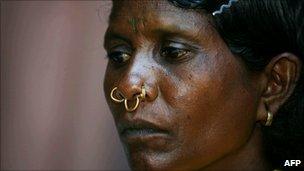India rejects Vedanta plans to mine tribal land
- Published

The tribes say the mining project will destroy their livelihood
India has rejected controversial plans by mining group Vedanta to extract bauxite in the eastern state of Orissa.
The project had breached environmental protection acts and raised concerns for the rights of local tribes, Environment Minister Jairam Ramesh said.
Vedanta's other ventures in Orissa were being investigated separately, he said.
The company has yet to comment on the decision. It says it will bring jobs to the area - tribespeople say the plans will destroy their sacred land.
Campaign group Survival International described Tuesday's decision as "a stunning victory" for the tribespeople.
'No prejudice'
Mr Ramesh said there had been "serious violations of environment protection acts" in Orissa's Kalahandi district, where Vedanta wants to mine the bauxite for an aluminium refinery it has built.
"There is no emotion, no politics, no prejudice... I have taken the decision in a purely legal approach. These laws are being violated," he told a press conference in Delhi.
As the tribes were "completely dependent" on the forest, any violation of the protection extended to their "habitat and habitations are simply unacceptable", the minister said.
Mr Ramesh said Vedanta had also been found violating "environmental clearance laws" for its existing aluminium refinery in the area.
The government would begin legal action against the company, he added.
The decision by the environment ministry came after a government report last week which said mining in the area would deprive two ancient tribes - the Kutia and Dongria Kondh - of their rights for the benefit of a private company.
The report concluded the mine would threaten the tribes' survival.
It may also have a serious impact on security, the report said, referring to a Maoist insurgency in parts of India. The rebels say they are fighting partly for the rights of poor tribal people displaced by large industrial projects.
'Sacred' hill
UK-based Vedanta, owned by Indian businessman Anil Agarwal, wants to extract bauxite from the Niyamgiri Hill range which is revered by the Dongria Kondh tribe.
The company has proposed a $2.7bn investment in the area and says the project will bring jobs and development to one of India's poorest districts. It has previously said it has complied with all rules and regulations.

Survival International has helped lead a successful campaign against Vedanta
The Dongria Kondh say the mining project will destroy their sacred hill and their source of livelihood.
Last week, Vedanta said it would be willing to move to another site.
"We are willing to look at alternate locations. Without the requisite approvals and clearances we will not even move an inch," Mr Agarwal said.
Vedanta is also facing hurdles in its bid for control of oil and gas explorer Cairn India, a potential deal valued at $9.6bn that could give the group a slice of India's oil reserves.
Survival International has helped lead a high-profile campaign against Vedanta's plans in India, where using land for industrial purposes is hugely controversial.
"This is a victory nobody would have believed possible," Survival campaigner Jo Woodman said in a statement.
"The Dongria's campaign became a litmus test of whether a small, marginalised tribe could stand up to a massive multinational company with an army of lobbyists and PR firms and the ear of government," he said.
The group has likened the plight of the Dongria Kondh to the fictional Na'vi tribe in the blockbuster James Cameron film Avatar.
Celebrities such as Bianca Jagger, Michael Palin and Joanna Lumley have spoken out against the mining project.
And in February, the Church of England sold its shares in Vedanta, saying that to do otherwise would be inconsistent with its ethical investment policy.
- Published16 August 2010